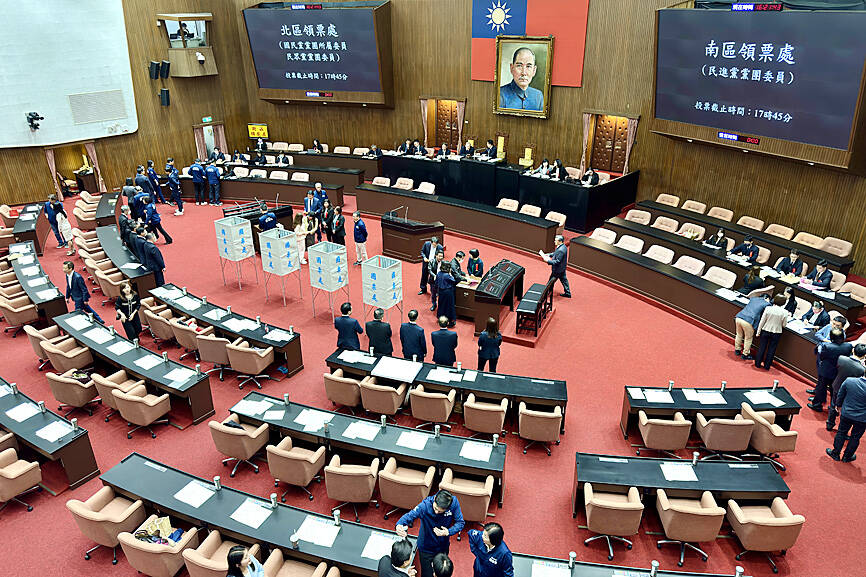Lawmakers yesterday rejected the Executive Yuan’s motions to reconsider the general budget and amendments to a law governing revenue allocations in a vote split along party lines.
In a 61-to-51 vote, the opposition-dominated legislature overrode the motions to reconsider the general budget and amendments to the Act Governing the Allocation of Government Revenues and Expenditures (財政收支劃分法).
In January, the Legislative Yuan voted to slash government spending by 6.6 percent, a historically deep cut, sparking a fierce clash between the opposition-controlled body and President William Lai’s (賴清德) administration.

Photo: George Tsorng, Taipei Times
The government had warned that the budget cuts would jeopardize essential programs ranging from national defense to the energy grid and agriculture.
Yesterday’s vote entered the budget into effect and sends the amendments to Lai’s desk.
All 52 Chinese Nationalist Party (KMT) lawmakers, independent lawmakers Chen Chao-ming (陳超明) and May Chin (高金素梅), who reliably vote with the KMT, and seven of the Taiwan People’s Party’s (TPP) eight legislators-at-large voted against the motions.
Former TPP legislator-at-large Wu Chun-cheng (吳春城) resigned from his post last month after becoming embroiled in an ongoing anti-corruption probe. Wu’s replacement, Liu Shu-pin (劉書彬), a professor of political science at Soochow University, was not yet sworn in and could not vote.
All 51 Democratic Progressive Party legislators voted for the motions.
Premier Cho Jung-tai (卓榮泰) on Tuesday told a plenary session that the legislature even compelled the Executive Yuan to take the initiative in slashing NT$63.6 billion (US$1.93 billion) from the budget without telling officials which programs should be cut.
The move likely contravened the constitutional division of powers, he said.
Article 49 of the Budget Act (預算法) stipulates that budget proposals must be “determined by the accounts of the agency, function and the fund,” Cho said.
He said the cuts and the funding suspensions would cripple government agencies’ ability to perform their functions, adding that the NT$100 billion cuts to Taiwan Power Co subsidies jeopardize the economy.
The proposed changes to the revenues and expenditures law would overturn the central government’s financial relationship with local governments, which infringes on the executive branch’s authority to allocate funds as stipulated by Article 147 of the Constitution, he said.
Under Article 3 of the Constitution, the Executive Yuan may with the president’s approval request that the legislature reconsider a bill, requiring lawmakers to vote on the matter again within 15 days of the motion’s receipt.

Nipah virus infection is to be officially listed as a category 5 notifiable infectious disease in Taiwan in March, while clinical treatment guidelines are being formulated, the Centers for Disease Control (CDC) said yesterday. With Nipah infections being reported in other countries and considering its relatively high fatality rate, the centers on Jan. 16 announced that it would be listed as a notifiable infectious disease to bolster the nation’s systematic early warning system and increase public awareness, the CDC said. Bangladesh reported four fatal cases last year in separate districts, with three linked to raw date palm sap consumption, CDC Epidemic Intelligence

Two Taiwanese prosecutors were questioned by Chinese security personnel at their hotel during a trip to China’s Henan Province this month, the Mainland Affairs Council (MAC) said yesterday. The officers had personal information on the prosecutors, including “when they were assigned to their posts, their work locations and job titles,” MAC Deputy Minister and spokesman Liang Wen-chieh (梁文傑) said. On top of asking about their agencies and positions, the officers also questioned the prosecutors about the Cross-Strait Joint Crime-Fighting and Judicial Mutual Assistance Agreement, a pact that serves as the framework for Taiwan-China cooperation on combating crime and providing judicial assistance, Liang

Reports of Taiwanese going missing, being detained or interrogated, or having their personal liberties restricted in China increased about fourfold annually last year, the Mainland Affairs Council (MAC) said yesterday. Last year, 221 Taiwanese who traveled to China were reported missing, were detained and interrogated, or otherwise had their personal freedom restricted, up from 55 the previous year, the council said. Reopening group tours to China would be risky, as it would leave travelers with no way to seek help through official channels after Beijing shut down dialogue between the associations tasked with handling cross-strait tourism, the MAC said. Taipei’s Taiwan Strait Tourism

SHIFT: Taiwan is evolving from a transit stop into a tourist destination, with more international travelers willing to spend on tours, dining and cultural activities Taiwan rose three places in the World Tourism Barometer to 36th globally in 2024, with international tourism revenue of US$10.028 billion, the Tourism Administration said on Monday. The UN Tourism Organization publication said that its focus has switched from whether a country has returned to pre-COVID-19 levels of tourism to the amount spent by a tourist during an overseas trip. The nation last year welcomed 8.57 million international tourists, about 9 percent more than in 2024, with most tourists coming from Japan, South Korea, and Hong Kong and Macau, all of which accounted for at least 1 million tourists each. During the first